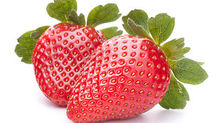12 Foods You Must Wash Before Eating
- Andrea Williams
- Mar 9, 2016
- 3 min read
Pesticides must be dealth with by the immune system. As we consume pesticides, they get lodged in our tissues and increase. The immune system becomes weakened, causing many problems with overall health. Since most of us want to support our bodies by eating lots of natural foods, we need to make wise choices about what we are fueling our bodies.
Because of modern farming practices, many chemicals are being used on our food. However, organic farmers do not use any products that are harmful to consume. Since is takes a great deal of effort to grow "clean" produce, this produce is more pricey. If you are on a budget and need to prioritize your organic purchases, or you would simply like to know which type of produce has the highest pesticide residues—and which do not—the following guide from the Environmental Working Group will help.

The Dirty Dozen should ALWAYS be bought organic. If not, you risk exposing yourself to 50-70 different chemicals. The following is the current list of the Dirty Dozen as well as the Clean 14. These lists are always changing so it is important to keep up with the most up to date information.
12 Most Contaminated
Peaches
Apples
Sweet Bell Peppers
Celery
Nectarines
Strawberries
Cherries
Pears
Grapes (Imported)
Spinach
Lettuce
Potatoes
These are the list of produce that is ok to purchase without being organically grown:
12 Least Contaminated
Onions
Avocado
Sweet Corn (Frozen)
Pineapples
Mango
Asparagus
Sweet Peas (Frozen)
Kiwi Fruit
Bananas
Cabbage
Broccoli
Papaya
Some produce is naturally protected. If you eat something like a pineapple or sweet corn, they have a protection defense because of the outer layer of skin. Not the same for strawberries and berries.
Using this list, can help you make wise choices and help you stay within a budget. You should do what you can do, but the idea you are going to wash pesticides off is a fantasy. But you should still wash it because you will reduce pesticide exposure.
How to wash produce

So how do I get all my produce clean enough to eat? Spray with vinegar before washing to remove the most bacteria. OR, you can use Essential Oils!! My most favorite oil to use is Lemon Essential Oil. A quick way to mix this up is to stir the produce around with your hand to make sure it all comes in contact with the lemon. Let sit for a minute or two. Rinse.
Besides washing and cooking, there are a few other ways to reduce the chances of getting sick from bacteria on produce. Local food is less likely to be contaminated, just because there are fewer stops between the farm and your house, which means fewer opportunities for clean produce to end up rubbing shoulders with something not-so-clean. (Bonus: If you’re concerned about pesticides, you can also ask the farmer about what chemicals they use.)Keeping veggies in the fridge also reduces bacterial growth, since bacteria don’t grow well in the cold. (Check your fridge temperature, by the way—it should be between 32 and 40 degrees, and the colder it is the longer your food will keep.)Want specific directions for different types of produce? Here’s a guide. Basically, tough veggies can be scrubbed, and leafy ones should be swished in water or rinsed as individual leaves.
Have questions? Let us know what you think?

















































Comments